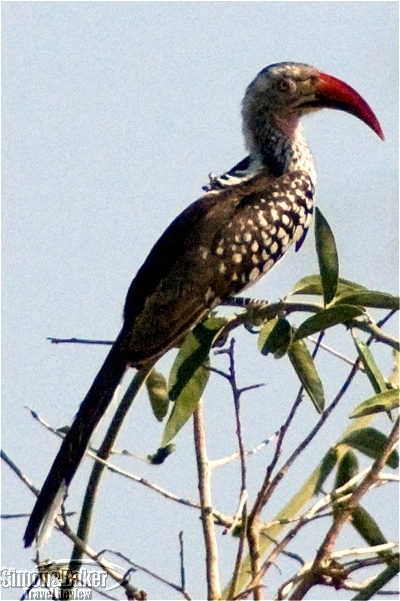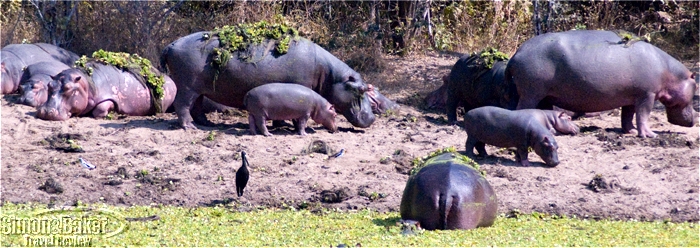

For all its superb isolation, Nkwali was only 45 minutes away from Mfuwe Airport, half of it on a paved road that ran through lively village scenes before turning into the bush close to the camp. Access to the park was either by boat directly from the camp, via a colorful hand-cranked pontoon or across the Mfuwe Bridge10 kilometers away. Game activity was as intense in the Game Management Area as in the park itself. The ten minute drive from the camp to the pontoon routinely took thirty minutes or more as we paused to watch the antics of a family of vervet monkeys, or a sudden domestic argument erupt from a cluster of hippos sunning themselves on the edge of the river.
My guide, Joseph Nfune, was a first rate professional. In addition to being thoroughly knowledgeable in animal behavior and natural history, he was quietly attentive to the wishes of “his” guests. After I casually mentioned my special desire to see a leopard, I was treated on my second morning drive to a lengthy close up viewing of a leopard, then two separate lion sightings for good measure! Locating the leopard took cooperative efforts from Joseph and one of his colleagues who engaged in an extensive radio dialog to direct us to the appropriate location. They were assisted by the terrorized screeches of a troop of baboons who had apparently just lost one of their own to the superb feline.
At Nkwali, I immediately felt like a welcomed guest in the home of a long lost friend. The staff were unfailingly friendly, attentive to every detail but never obtrusive. The hospitality was flawless; the understated luxury of the accommodations was enhanced by the superior quality of service. What a lovely place to begin a safari!
Communications The camp had cellular phone coverage with a GSM 900/1800 compatible international cell phone. The office featured a satellite internet connection, where guests could check e-mail.
Handicapped Access No
Length Of Stay Two nights
Location Nkwali was located a few miles southeast of Mfuwe on Robin Pope’s private land on the east bank of the Luangwa River, in the Game Management Area across the river from the South Luangwa National Park.
Manager Kiri Phiri
Owners Robin and Jo Pope and Molecaten Africa
Power The entire lodge was on the electrical power grid and ran on 220 Volts/50 Hz power . A NW-135C adapter was necessary to use most electrical outlets (the kind used in the U.K.). However, the bathroom featured a universal socket that accommodated European and U.S. plugs as well as the British ones. Obviously intended for electric razors, it was also ideal to recharge camera and other small electronics batteries.
Size Nkwali was a three-acre enclave in the heart of the 110 acres of Robin Pope’s private land. The six guest chalets, the bar and the dinning area were dotted along 150 yards of the one third of a mile river frontage of the property. The remainder of the property was left in its natural state and offered a densely populated wildlife habitat. The camp could accommodate a maximum of 12 guests. It employed a staff of 54 including a game viewing staff of four guides and trackers.
Transportation Mfuwe could be reached by air from Lusaka and Livingstone. Road transfers to and from the airport were arranged by Robin Pope Safaris, who owned and operated the camp.
Year Open-Renovated Originally opened in 1991, Nkwali was the object of meticulous on-going maintenance and enhancements. Although the region had been the site of devastating floods five months before, the property was pristine throughout by the time I visited.
Room My chalet (Number One) was steps away from the main building. It included a spacious 240 square foot (22 square meters) sleeping and sitting area with a steep thatched roof under the shade of a mature Natal mahogany. The floor was made of local stone with grass throw mats. The room occupied about half of the chalet; the other half was a spectacular open air bathroom. The décor was elegantly simple and comfortable. The walls were of immaculate white plaster that beautifully offset the dark wood furniture, including free-form storage shelves hanging on opposite sides of the room. The twin beds were covered with bright coral and white throws of local fabric, and separated by a small table. A luggage bench stood at the foot of each bed. This sleeping area was surrounded by a walk-in mosquito net. Two director’s chairs and a coffee table faced the open front wall of the chalet with its panoramic view of the river. At night, a wrought iron screen kept at bay any visiting wildlife. A small desk and chair completed the décor.
Swimming Pool Tucked away in a clearing a short five-minute walk from the bar, this 14 by 45 foot pool went from a depth of four to six feet. It could satisfy even dedicated lap swimmers. It was surrounded by two bamboo and thatch changing huts that held ample supplies of towels. With its six comfortable wooden lounge chairs topped by thick canvas pads, the pool area was a lovely place to while away hot midday hours.
Recent Awards And Recognitions Jo Pope was the recipient off the prestigious 2005 U.K. Responsible Tourism Award, best personal contribution category. This award recognizes significant personal contribution to responsible tourism.
In addition to their unwavering, long time support of sound environmental practices, Jo and Robin Pope observed many of the tenets of sustainable development in their organization. Staff were trained and promoted internally: in addition to Chef Lamack Zulu, another notable success was camp manager Kiri Phiri, who worked his way to his current position through 14 years with Robin Pope Safaris. Jo and Robin were also engaged in a carbon sequestration and a long term reforestation program, Reforest Nsefu. As part of the program, the project leaders worked with schools and villages to reforest a local area with trees for domestic use (fire wood, building materials, fruit trees), while protecting old growth forest and offsetting carbon emissions from the Robin Pope Safaris activities.
Jo Pope was also the leading force behind the development and success of the Kawaza School Fund which supported the refurbishing and expansion of four local schools. Additionally, it sponsored 50 children on to secondary school and subsidized teachers’ salaries to allow for a lower student/teacher ratio.
Date Of Last Visit June 2007
ReviewersArticle and photographs by Josette King
Service Excellent! Every member of the staff was consistently friendly, thoughtful and available to fulfill, or occasionally anticipate, all my needs and wishes. This was reflected in their attention to the smallest details, such as welcoming the return of the game drive vehicle on a cold evening with hot towels instead of the traditional iced ones (I visited in late June, the coldest month of the year, when nights do get chilly).
Would You Stay There Again? Yes
Contact Information
- Robin Pope Safaris
- Nkwali Camp
- PO Box 80
- Mfuwe, Zambia
- +260 21 624 6090
- +260 21 624 6091
- +260 21 624 6092
- + (260) 21 624 6094











